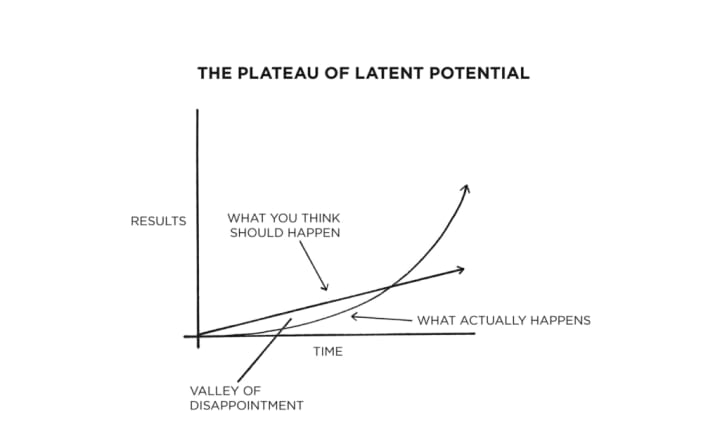6 Tips to Help You Form a Good Habit
Good habits are essential for our character development, but properly forming a good habit will help you achieve your goals in an effective, beneficial, and satisfying way.

Habits are part of our daily life. We may wake up at the same time each day, wear the same clothes, and travel on the same road even without us being aware of our actions. Forming habits is a powerful tool to either exponentially improve our lives or put us at a dead end. That's why forming good and long-term beneficial habits is so crucial in surviving and thriving.
So, why is forming good habits so hard?
This question is something most of us can relate to. You can play video games all day and struggle to just read one page of a book every day. Why? Because we tend to repeat a certain behavior based on its immediate physical or emotional consequences. You read one page of the book; you quickly feel bored and thus have no motivation to do so again. You play video games; their astounding visual effects plus a little pride in your victory of the first easy match make your brain satisfy and want to play more.
So, is it impossible to form good habits? Of course not because I'm writing this article. Fortunately, there are tons of ways to help you form healthy habits such as regular exercise and sleeping on time, and we just need to perform them correctly. Below are some tips to get you off to a good start when forming good habits:
1. Understand that you gain motivation to do something by doing it first.

James Clear, the author of the #1 New York Times bestseller, Atomic Habits, once said in his book, "Motivation is often the result of action, not the cause of it". This quote is something I couldn't comprehend because the definition of the word 'motivation' clearly states that it is the reason for us to behave in a particular way. When forming a habit, however, you often hope for a burst of motivation to do it; we can all agree that good habits are hard to achieve, so by waiting for the motivation to come first, you limit yourself in terms of time, effort, and capabilities to do so.
My journey in writing an article will be like this: I come up with a new idea -> Even though I feel lazy to write something, I decide to write down whatever is in my head, including the title and sometimes a picture along with it -> I read what I just wrote one time, and I want to fix this or fix that. What often ends up for me is I get more new ideas, but what even greater is that I successfully build my motivation exponentially to finish that article as soon as possible, so motivation will be there for me the next time I continue working on my story.
See?
2. Start with something small and easy.

Oftentimes when we perform a new good habit, we start with a minimum of motivation. During this stage, we usually are subjected to giving up if any aspect of that habit exhibits boredom, difficulty, or frustration, so we would get less motivated to redo such habit again in the future. So starting with something small and most likely to interest you will be essential in habit building. For example, if you start reading a book and are very into gaming, read a game review or interesting story about a notable gamer. You can take advantage of your curiosity by limiting how much you will read because then your brain would want you to read more.
3. Design your environment

Designing the surrounding, in my opinion, is the most powerful tool to help form a new habit. It gives you an indication of what you often do in a particular place and urges you to do it every time a clear sign is given. Notice every time we get home, we may just want to have some snacks, watch TV, or sleep. That's because we've been doing so for so long; our brain believes that our home is where those habits should be executed.
So, how will it go in terms of forming good habits?
In most cases, the bigger the indication, the faster our brain will respond to it and urge us to do something we previously got done. Unfortunately, our environment is often where we perform old habits that may interfere with or even prevent new habits to take place. If you want to exercise in the living room where you spend most of the time watching TV, then it's less likely that you will exercise.
One way to address this is to find a place that is new to you, that you rarely visit, or that stimulates your new behavior. If you want to read a book, for example, you can do so in your home office where you spend time working on your computer and dealing with stacks of work papers. You may want to place an open book in the middle of your desk or just surround your desk with your favorite books to stimulate your brain's response to the environment.
4. Stack your habits by applying the "Diderot effect"

Forming good habits is much easier in the right environment, but what if you can take advantage of your old habits by stacking them with the new ones?
The 'Diderot effect' originates from the story of Denis Diderot, a French philosopher, who struggled to pay for the wedding of his daughter. Moved with compassion, Catherine the Great, the Empress of Russia, decided to buy Diderot's personal library for more than $150,000 after hearing about his financial trouble. Diderot had money to spent not only on the wedding but also on a scarlet robe. Interestingly, the man decided that since the scarlet robe was so beautiful, he would upgrade his possessions by decorating his home with expensive sculptures. One purchase led to another: a new mirror, a leather straw chair, a better kitchen table, and so on.
Diderot's behavior is not uncommon. You buy a new shirt, for example, then happen to purchase a pair of shoes that fit the shirt well. You buy a new computer and consider buying all the peripheral devices. This is a chain of purchases, but what about forming good habits?
By applying the 'Diderot effect', you decide what to do next after whatever you just got done. Try stacking a new habit with a normal habit that you've been performing on a daily basis such as brushing your teeth or doing meditation, and the formula would go like this:
After I (Current Habit), I will (New Habit)
Ex.: After I wake up, I will read a book for fifteen minutes.
In addition, you can create larger chains of small habits or insert new habits in the middle of two existing ones. Apply this consistently to see remarkable results.
5. Keep in mind that any progress matters

If you have ever tried to learn a new language and have been doing so for months, you usually find yourself barely speaking any complex sentences to the native speakers. It leaves you wondering why you haven't made any noticeable progress; there are sometimes only frustration and discouragement. This stage of forming a new habit is normal. When we try to achieve something, our mindset tends to define the road to accomplishment on a more straight and favorable side. In reality, however, the road to success in most cases is very disappointing at first until you passed the 'Valley of Disappointment', or the border between the results we expect and the reality.

In the graph above, the straight line represents how we expect the results would go, and the curved line represents what actually happens. When we start a habit, there should be no noticeable progress at first below the straight line until the result grows exponentially that you start to appreciate all the small steps you got done previously.
6. Sit a while and think

As this article comes to an end, it is your turn to get started by applying these tips to form a good habit. One problem I have, however, is that you may need to get more motivated to start. I've been reading many useful articles, but my life hasn't changed much because I never do anything (I am just lazy). So, sit a while a think. Brainstorm what you will do, why you do it, and what benefits it gives you. There are many more useful articles out there that you should check out, but keep in mind that you are the one who decides to change or not.
Be wise and happy!
About the Creator
ArtisKev N.
A writer, pianist, and artist to be. I write about writing advice, my personal life, and my opinions on different topics. Support me: https://rb.gy/ym5py






Comments
There are no comments for this story
Be the first to respond and start the conversation.